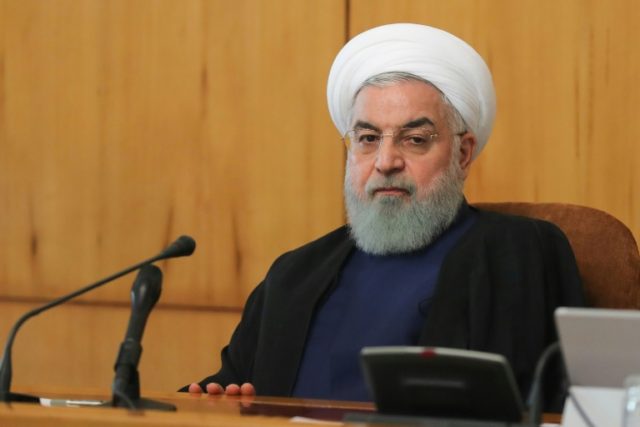Iranian President Hassan Rouhani gave a nationally televised speech on Monday in which he vowed to continue oil exports in defiance of U.S. sanctions and condemned America’s “psychological war” against his regime.
Reuters provided a few choice excerpts from Rouhani’s fiery speech:
“We will not yield to this pressure, which is part of the psychological war launched against Iran,” Rouhani said in a speech in the city of Khoy, broadcast live on state television.
“They have failed to stop our oil exports. We will keep exporting it … Your regional policies have failed and you blame Iran for that failure from Afghanistan to Yemen and Syria,” he added, to chants of “Death to America!”
Rouhani said Washington lacked the necessary international support for its sanctions, and noted that it had granted temporary waivers to eight major buyers of Iranian oil.
“America is isolated now. Iran is supported by many countries. Except for the Zionist regime (Israel) and some countries in the region, no other country backs America’s pressure on Iran,” he said.
Contrary to Rouhani’s assertions, the new round of sanctions is having far more than a “psychological” effect on Iran. Reuters on Monday found “hundreds of companies have suspended production and thousands of workers are being laid off because of a hostile business climate mainly caused by new U.S. sanctions.” Many of the businessmen interviewed said there only months or weeks away from laying off more employees or shuttering their enterprises entirely.
“Four days before parliament fired him August for failing to do enough to protect the jobs market from sanctions, labor minister Ali Rabiei said Iran would lose a million jobs by the end of year as a direct result of the U.S. measures,” Reuters recalled.
Iranian business owners blamed poor decisions by their own government and the financial sector, in addition to U.S. sanctions, for the job losses. They also spoke of money and optimism surging into their economy after the nuclear deal negotiated with former U.S. President Barack Obama lifted longstanding sanctions against Iran, only to see the optimism drain as Tehran spent the nation’s newfound wealth on foreign adventures and imposed confusing monetary policies that kneecapped the Iranian recovery.
The Trump administration sanctions dealt a powerful blow to an already weak economy and it will soon dawn on Iran’s business class that their government has no reason to make things easier on them. On the contrary, the regime will want to maximize suffering for the Iranian middle and lower classes so it can complain about the humanitarian horrors of harsh sanctions, once Rouhani is finished pretending the U.S. measures are no more than a trifling inconvenience.
E.U. anger at Iranian plots to murder dissidents in Paris and Denmark have jeopardized Iran’s hopes for a European bailout, as the E.U. imposed sanctions against several Iranian conspirators with more to come.
“Though largely symbolic, the E.U.’s readiness to target Iranians marks a shift after months of division within the bloc over how to punish Iranians accused of destabilizing activities in Europe and the Middle East,” Reuters noted on Monday.
Ironically, Iran’s best hope for relief from sanctions pressure may lie with its archrival Saudi Arabia. The Saudis sent mixed signals about oil production over the past few months, at first promising to easily compensate for the loss of Iranian exports – with a little help from the cheerfully opportunistic Russians – but then talking about production cuts and warning of oversupply in 2019.
Market analysts say the Saudis now believe President Donald Trump essentially tricked them into overcompensating for lost Iranian oil, and they are disappointed by Trump’s waivers to eight of Iran’s biggest oil customers. The global economic slowdown produced by the U.S.-China trade war is keeping oil demand down, while the growing strength of American producers increased supply. If the Saudis overcompensate in the opposite direction with production cuts during their anticipated “U-turn” on oil next year, they could awaken the appetite for Iranian oil just as the Trump administration’s temporary waivers expire.

COMMENTS
Please let us know if you're having issues with commenting.